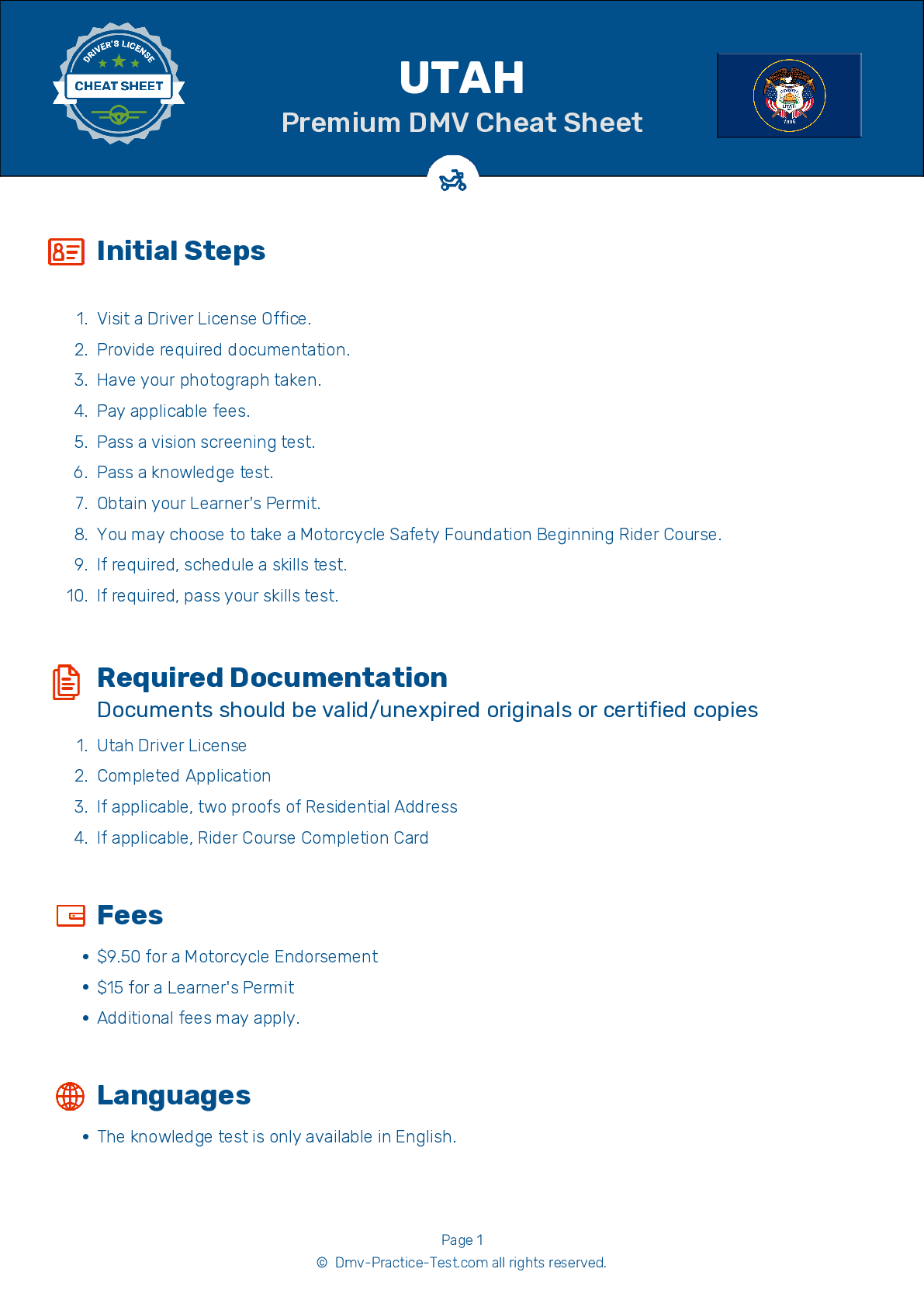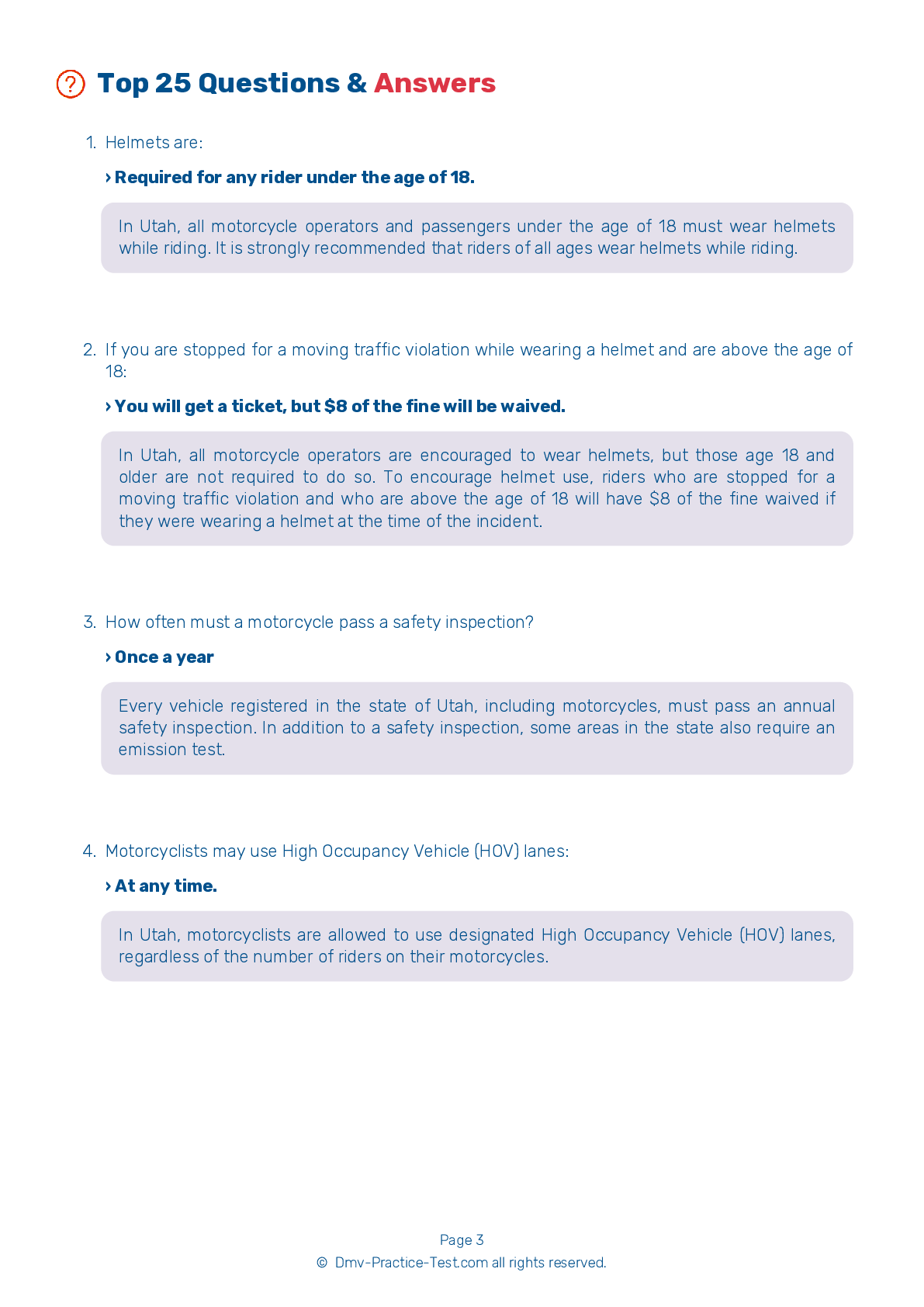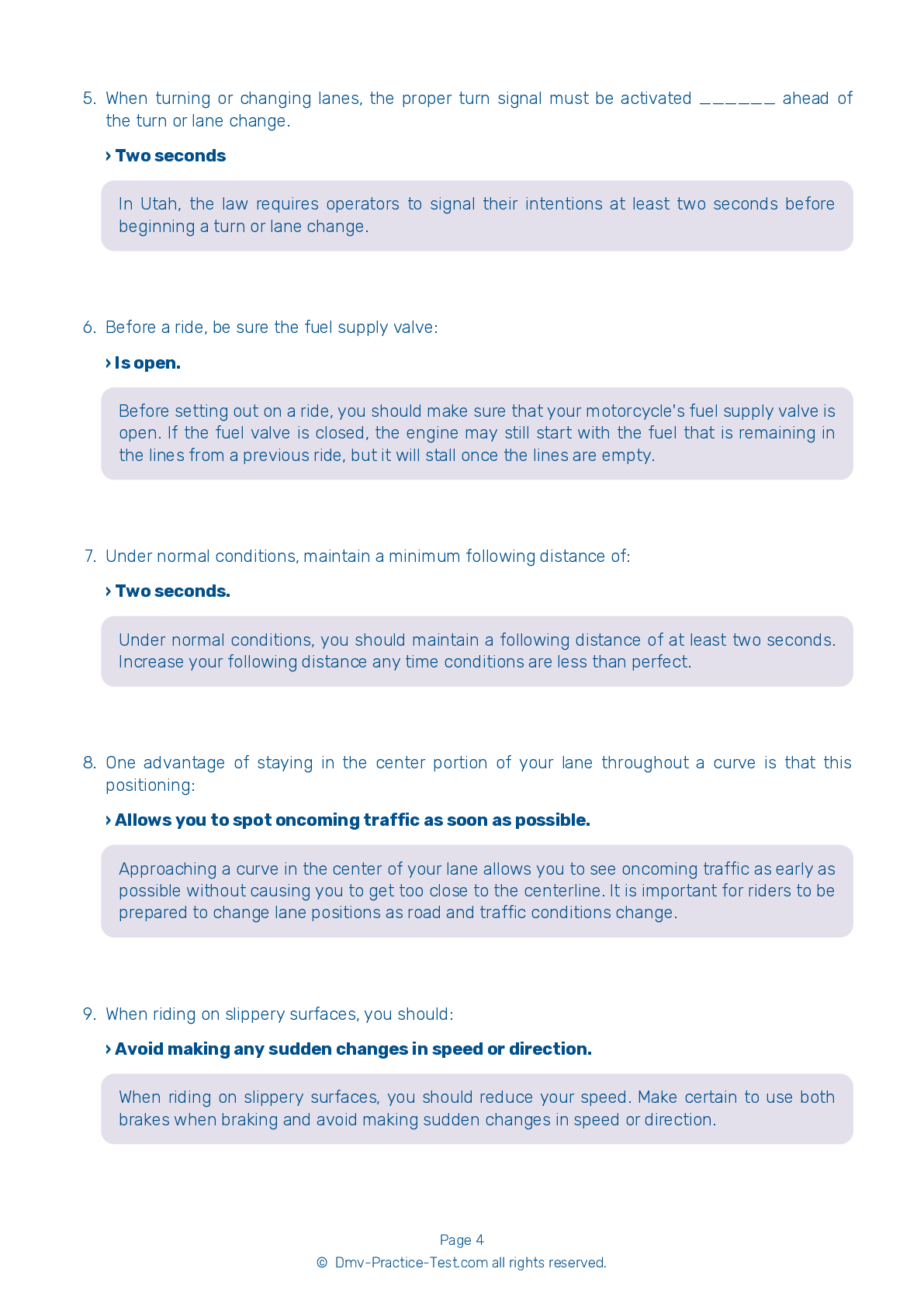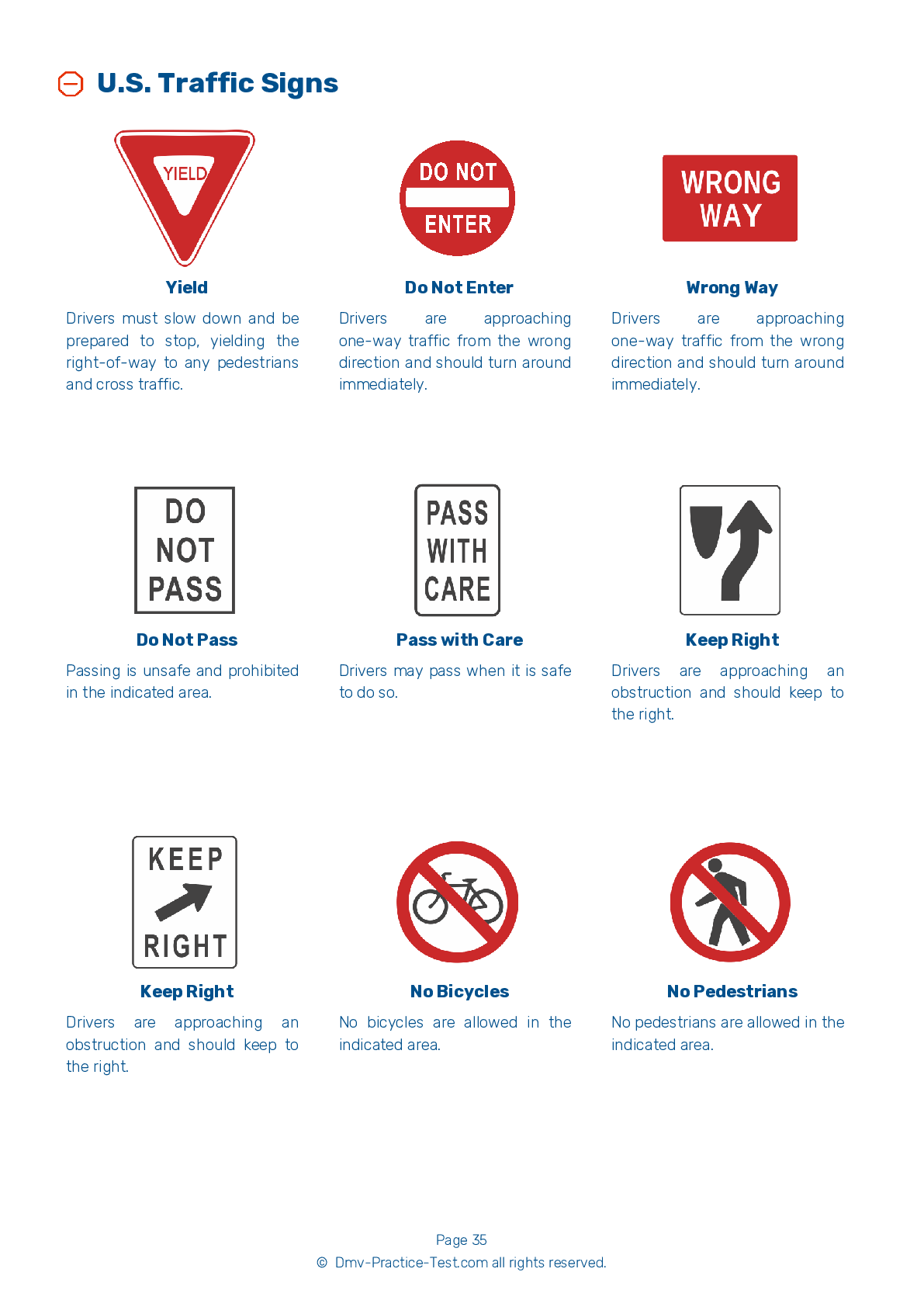DMV Permit Test #7
Motorcycle Test | License UT 2026 | FREE Online Practice! #7
Take this FREE motorcycle test (license in UT 2026) to check your knowledge of the road rules. To improve your results, download a motorcycle handbook online, study theory, and practice for free on our website. Still worried about how to get a motorcycle license in Utah in 2026? Check our website for more sample tests, train as much as possible, and boost your grades!
25
20
16
1 . What does this hand signal mean?
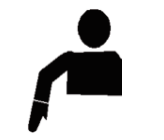
Backing up
Instead of or in addition to mechanical turn signals, operators may use hand signals to indicate turns or stops. If an operator's left arm is bent at the elbow and pointing downward, it means the operator plans to slow down or stop.
2 . If you are stopped for a moving traffic violation while wearing a helmet and are above the age of 18:
You will get a ticket, but it won’t appear on your driving record.
In Utah, all motorcycle operators are encouraged to wear helmets, but those age 18 and older are not required to do so. To encourage helmet use, riders who are stopped for a moving traffic violation and who are above the age of 18 will have $8 of the fine waived if they were wearing a helmet at the time of the incident.
3 . To steer a three-wheeled motorcycle, you should:
Point the back wheels in the direction you want to travel.
Three-wheeled motorcycles and two-wheeled motorcycles steer differently. Since three-wheeled vehicles cannot lean, the front wheel needs to be pointed in the direction you want the vehicle to go.
4 . When your mirrors are properly adjusted, you should see:
The front of your helmet.
Adjust your mirrors so you can see the lane behind you and as much as possible of the lane next to you. When properly adjusted, a mirror may show the edge of your arm or shoulder, but it’s the road behind you and to the side of you that is most important.
5 . A proper lane position should:
Provide escape routes.
A properly chosen lane position should provide a number of benefits, including an increased ability to see others and to be seen. It should help you avoid wind blasts, other drivers' blind spots, and surface hazards. Your lane position should discourage other drivers from trying to share your lane and provide you with an escape route, should a hazard arise. Choose a lane position that maximizes your space cushion.
6 . When being passed by another vehicle, you should:
Try to share the lane with the passing vehicle.
When being passed, it is generally safest to ride in the center portion of your lane. Riding on the side nearest the passing driver increases the danger of colliding with them, and riding on the side farthest from the passing driver may tempt them to return to your lane too soon.
Need Motorcycle Insurance? No problem!
Compare the best rates in Utah and find a personalized policy that meets your needs.
1. Are You Currently insured ?
2. Married ?
3. Do you own your Home?
4. Have you or a Family Member Honorably Served in U.S. Military ?
5. Your Name
6. Age
7. Zip code
Ranked by best match
2026 Utah | Frequently Asked Questions
To acquire a motorcycle license in Utah, you must first obtain a motorcycle learner's permit. This involves passing a written test. After practicing with your permit, you can take the road skills test to get your motorcycle license. Alternatively, completion of a Motorcycle Safety Foundation course can waive the road test. You must be at least 16 years old to apply.
In Utah, the minimum age to obtain a motorcycle endorsement is 16 years old. However, if you are under 19 years old, you must first hold a motorcycle learner's permit for two months before you can get a motorcycle endorsement on your driver's license.
Yes, in Utah, you need a dedicated motorcycle endorsement on your driver's license to legally operate a motorcycle. This requires passing a knowledge test and a skills test. If you don't already have a regular driver's license, you'll need to get that first before applying for the motorcycle endorsement.
To apply for a motorcycle driver's license in Utah, you'll need a few key documents: proof of identity (like a birth certificate or passport), proof of Social Security number, and two proofs of Utah residency. If you're under 18, you'll also need a parental consent form. You must also provide proof of driver education if you're under 19.
Yes, to obtain a motorcycle license in Utah, you are required to pass a written exam. This test assesses your knowledge of motorcycle operation, safety rules, and traffic laws. However, you can substitute the written test by successfully completing an approved motorcycle rider training course.
The motorcycle written test in Utah covers various topics including traffic rules, road signs, safe riding techniques, and handling difficult situations. It also includes questions about motorcycle-specific laws in Utah such as helmet use, lane sharing, and carrying passengers or cargo. The test is designed to assess your knowledge and understanding of safe motorcycle operation.
Yes, in Utah, you can substitute the written test with a state-approved Motorcycle Rider Education course. Upon successful completion, you'll receive a certificate which you can present at the Driver License Division. This will waive the written test, but you still need to pass the skills test to get your motorcycle endorsement.
To enroll in a motorcycle training course in Utah, you need to find a Motorcycle Safety Foundation (MSF) approved course. You can do this online or by calling local driving schools. Once you've chosen a course, register and pay any necessary fees. Attend all classes and successfully complete the course to receive your certificate, which can be used for license endorsement.
No, you do not need to own your own motorcycle to take the license test in Utah. You can borrow a motorcycle as long as it's registered, insured, and street-legal. The important thing is that you're comfortable and familiar with the bike. Remember to bring a DOT-compliant helmet for the test.
Yes, you can use a friend's motorcycle for the driver's license evaluation in Utah. However, the motorcycle must be street-legal, registered, and insured. You will also need to bring a helmet that complies with DOT standards. Remember to ensure you're comfortable and familiar with the bike before the test.
Yes, in Utah, the motorcycle driving exam tests specific handling skills. These include starting and stopping, turning and swerving, quick stops and obstacles, speed and gear adjustments. The test also evaluates your ability to balance the motorcycle at low speeds. These skills ensure that you can handle a motorcycle safely under various traffic conditions.
Yes, Utah imposes certain restrictions on new motorcycle drivers. For those under 19 years old, they must hold a motorcycle learner's permit for two months before getting a motorcycle endorsement. They also need to complete a state-approved Motorcycle Rider Education course. After receiving the endorsement, there aren't specific limitations but safe riding practices are always encouraged.
Yes, your Utah motorcycle license permits you to ride a motorcycle out of state. All U.S. states have reciprocity agreements, recognizing licenses issued by other states. However, while riding in other states, you must adhere to their specific motorcycle laws and regulations, which may differ from those in Utah.
In Utah, the law requires all motorcycle riders and passengers under the age of 21 to wear a helmet. However, those aged 21 and over are not legally required to wear a helmet, although it is strongly recommended for safety reasons. Helmets must meet the safety standards set by the U.S. Department of Transportation.
In Utah, there are two types of motorcycle licenses: motorcycle endorsement and motorcycle-only license. The motorcycle endorsement can be added to a regular driver's license, while the motorcycle-only license is for individuals who only want to operate a motorcycle. Both require passing a knowledge and skills test.
Yes, you can add supplementary endorsements to your motorcycle license in Utah. These endorsements allow you to operate additional types of vehicles. For instance, adding a "Passenger" endorsement lets you carry passengers on your motorcycle. To add an endorsement, you're required to pass additional written and skills tests and pay the applicable fees.
Yes, Utah's Department of Motor Vehicles (DMV) offers the motorcycle license test in multiple languages. However, it's recommended to contact your local DMV office beforehand to confirm the availability of your preferred language. Regardless of the language you choose, you need to demonstrate a solid understanding of traffic laws and road signs.
An effective strategy to prepare for the motorcycle license test in Utah includes studying the Utah Motorcycle Operator Manual thoroughly. This guide covers all the information you'll need. Additionally, taking online practice tests can be very beneficial. They simulate the actual test environment and help you familiarize yourself with the format and type of questions asked.
Yes, in Utah, the motorcycle written exam is offered in several languages other than English. However, it is recommended to contact the nearest DMV office to confirm the availability of the language you prefer. Remember, no matter the language, you must demonstrate a thorough understanding of road signs and traffic laws.
If you don't pass the motorcycle written test in Utah, you are allowed to retake it. However, you must wait for one day before you can retake the test. It's recommended to study the motorcycle handbook thoroughly before attempting again to increase your chances of passing.
